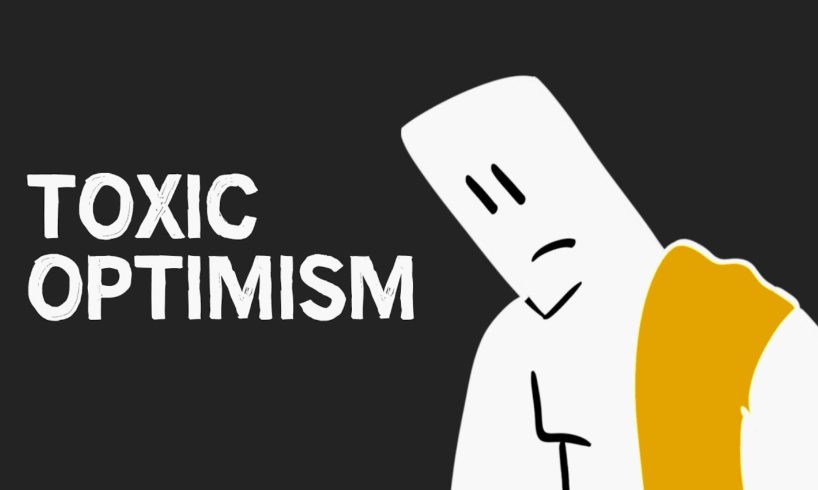
Generally, people praise the optimistic mindset, and research suggests that optimism helps us reduce stress and depressive symptoms. Hence, optimism seems to be a healthy coping mechanism for dealing with the future when looking at the scientifically proven benefits.
But does optimism also have downsides? Can some forms of optimism even be dangerous? And could it be that, in some cases, we’re better off being pessimistic? This video explores why optimism may not always be the wisest choice and why being a pessimist may be the best move.
Support the channel:
✔️ PayPal: https://www.paypal.me/einzelgangerco
✔️ Patreon: https://www.patreon.com/einzelgangster
✔️ Bitcoin: 3HQnEz1LQ4G6dqN2LdZgzc7qoJjJCyWjTC
(Donated BTC and want in the credits? Send me an email with the amount/address)
🎞️ Animations and thumbnail art by Munkaa:
https://www.youtube.com/user/jus7y
Purchase Stoicism for Inner Peace (affiliate links):
📘 Paperback: https://amzn.to/3wB9iHb
💻 Ebook: https://amzn.to/2RdjbKV
Purchase Unoffendable (affiliate links):
📘 Paperback: https://amzn.to/2RJYfti
💻 Ebook: https://amzn.to/35e23a5
Merchandise:
🛍️ Shop: teespring.com/stores/einzelgangerstore
🛍️ Merchandise design by Punksthetic Art:
https://www.youtube.com/user/JRStoneart
Creative Commons (attributions):
Auschwitz footage: https://archive.org/details/Auschwitz1946
Nagasaki: https://archive.org/details/428Npc2586NagasakiBurst
Bombing Germany: https://archive.org/details/BombingNorthernGermany
Frankl: https://commons.wikimedia.org/wiki/File:Viktor_Frankl2.jpg
Roman bathhouse: https://commons.wikimedia.org/wiki/File:Hull_bathhouse_6_July_2018.jpg
Epictetus: https://commons.wikimedia.org/wiki/File:Discourses_-_Epictetus_(illustration_1)_(9021700938).jpg
00:00 – Intro
03:27 – (1) We won’t be shocked when bad things happen.
06:15 – (2) We can use the situation advantageously.
09:53 – (3) We’ll appreciate a positive outcome.
#toxicpositivity #optimism #pessimism
source







Preparing for worse is putting yourself in the suffering preemptively. Why not middle way? Having no expectations and observing the happening and your body’s and mind’s response without judgement?
Yes you are right it just happened to me last week. I went to 4 interviews I was optimistic about 2 but it failed the other 2 I was not sure but attended to my surprise they called me back for next round. Yes giving your best and not expecting much will give you much better experience than what you expected. Thanks for this video
People were optimistic about the Titanic being unsinkable
I've noticed this about work. If I expect to get zero customers and that my co-workers will be jackasses, I can be pleasantly surprised. If I expect it's gonna be decent or good (even if it looks that way on paper before I start) I can be easily disappointed.
I have to suffer in life to see the whole picture…we lose and learn to win etc. I think acceptance is key.
Someone said that an optimist is an uninformed pessimist.
*"This life is good for those who don't know it"*. -Tales of Miletus
Why not be realistic instead of becoming pessimistic or optimistic? Another thing is Seneca says 'imagination is more suffering than reality' how to apply this with pessimistic attitude? This reminds me negative visualization. But in that case how to stay calm? How to end that meditation? Imagining the worst case scenario and even in that case imagining you are not affected by outer events? Only good and bad comes from inside, which are under our control.
Hope for the best but prepare for the worst.
… as a German Biologist – this is about conditionings of PAIN – Reward patterns – expectations – to filter out only what we prefer versus what to ignore. Optimism refuses the existence of Antagonisms- a small counterforce can eliminate a big synergy. All accidents happen this way. It is stoicism and pragmatism – to be wide awake and Aware of all things – not filtering, not dreaming. In evolution this is an elimination process. All heroes die horrible deaths.
Being a realist is a balanced way to get through life. Not everything is rainbows and sunshine, but not everything is dark clouds either. We often just make our own choices, and only a small part of life is out of our hands.
Haven't watched the video, but I've been thinking this way since I was a teenager. I would rather be pleasantly surprised at positive behavior from people occasionally, than to be constantly disappointed by their negative behavior. All you have to do, is expect all humans to be mostly crappy people. This way, you are never disappointed, but occasionally you are pleasantly surprised.
Thank you so much for this I really needed that
"The life always meaningful in any life condition"
That's amazing 🤩
You’re better off not being too much of either maybe a little bit of a optimist and a little bit of a pessimist for certain issues
The last few vids on this channel are extremely c*cked lmao
Expectation is the root of all heartache
Stoicism is the only way to endure this valley of tears called existence, this planet is a game reserve for human animals.
Just do whatever works for you. I like pessismism, it's comforting for me. I either get exactly what I predicted, or I'm pleasantly surprised. It really alleviates the burden of having high hopes for the world
I think it's such a bullshit way of thinking, positive or negative. The glass is neither half full nor half empty, it's just a glass of water dude. Not to be a realist here bc that is also a stupid term
There's a song in the Mel Brooks' film The Twelve Chairs, If You Want to Expect the Best, Expect the Worst.
But that's not what happens. When the pessimists expects the worst and it doesn't happen, they're not relieved or grateful. They're angry and bitter, and will stay that way until they convince themselves they were right after all.
That's why I ask people : would you rather be right, or happy.
Having optimictic expectations doesn't mean being optimistic. Optimistic means you look at things that has already happened and are set, and you look at their better side.
Balance (though difficult to accomplish as people in general tend to be creatures of EXTREME) is KEY. A bit of BOTH is needed in order to navigate life in a healthy way.
" A pessimist is an optimist who has become frustrated with his optimism. He hoped too much and failed, he dreamed too much and could not achieve anything substantial.
The pessimist is an optimist standing on his head; they are not different fellows — that's what I want to make clear to you. Unless you have been an optimist you can never be a pessimist. First you have to become an optimist.
And each child is brought up with great optimism. All parents think that they have great children. Ask any mother: she thinks she has the unique child; the most superior, rare, incomparable. Each mother brags about the child. Parents bring up children with great optimism that they are going to be Alexander the Greats or Jesus Christs or Gautam Buddhas.
But slowly slowly life proves just the contrary. Slowly slowly, the child becomes aware of his ordinariness. He becomes aware that these great dreams, that these great ambitions, cannot be fulfilled. And by the time one is coming closer to forty, forty-two, pessimism starts settling — gloom, darkness….
Now medical science is aware that most heart attacks happen nearabout forty to forty-four, between those four years. Most people go mad between those four years, forty to forty-four. Psychologists, psychoanalysts, are aware that that is the most dangerous time. If you can remain sane beyond forty-four, that means you will remain sane. But many people fall flat.
And don't think that if you are sane even beyond forty-four… that does not mean that you are very intelligent. It may only be that you are very dull and it takes a long time for you to understand. It may only be that you are very insensitive. It may only be that you are foolhardy, that you don't listen to life, what life is saying, that you go on hoping.
But sooner or later, a person starts feeling that life has gone down the drain. Optimism turns sour and becomes pessimism. Optimism, that hopefulness, turns upside-down; a hopelessness settles in. Then everything looks dark and dismal. First you used to count the roses, now you start counting the thorns. First you used to say, "How beautiful this roseflower and what a miracle! It grows amongst thousands of thorns." You were poetic, you had some aesthetic sense; you still believed that life is going to be a fulfillment.
But soon the day comes when the roses start fading away and you start counting the thorns, and you cannot believe in the roses anymore. You start saying, "It is impossible! The rose must be a dream, the rose must be MAYA, illusion, hallucination. How is it possible amongst thousands of thorns, how is a rose possible?" It looks contradictory, it looks illogical, it cannot happen in the nature of things. You start counting nights; before, you used to count days.
The optimist says, "There are two days, and between two days just a small night to rest." And the pessimist counts the nights; he says, "There are two long nights — nightmares, ugly dreams, tortures — and just a small day sandwiched between the two." Life is the same: you can count the days or you can count the nights. If you count the days you are an optimist, if you count the nights you are a pessimist, but there is really no difference.
The optimist can become a pessimist, the pessimist can become an optimist. They are not contraries; they are two points on the same spectrum.
One has to go beyond both. A sannyasin has to go beyond both — neither hope nor hopelessness. No need to count days, no need to count nights. Be a watcher! No need to count thorns, no need to count roses. Be a watcher….
I don't teach you optimism. In the West it is very fashionable nowadays; it is called "positive thinking." That is a new name for optimism; the old name has become a little too out of fashion, out-of-date. The new name is positive thinking. I don't teach you positive thinking, because positive thinking carries the negative in its wake.
I teach you transcendence — neither positive nor negative. Be a watcher: witness both. When there is day, witness the day, and when there is night, witness the night — and don't get identified with either. You are neither the day nor the night; you are the transcendental consciousness. Become more and more centered there in that transcendence.
True religion is not positive, nor is it negative. It is neither via negativa nor via positiva; it is via transcendence.
There are people who are continuously looking for the negative — and if you look for the negative you will find it, because the negative is there in the same proportion as the positive.
If you look for the positive, you will find the positive. But by finding the positive you cannot destroy the negative; the negative is there, side by side. They are always together like negative and positive poles of electricity. You can't have electricity with one pole, you will need both.
Life needs both: thorns and roses, days and nights, happiness/unhappiness, birth/death.
Be a witness to it all and you will know something that is beyond birth, beyond death; something that is beyond darkness and beyond light; something that is beyond happiness, beyond unhappiness. Buddha has called it peace, nirvana."
Being optimistic doesn’t always equate with being naïve. You can maintain hope that circumstances will improve even in situations where it doesn’t seem like any hope remains. This doesn’t suggest that one should downplay a dire situation, it’s more along the lines of believing that one can overcome this obstacle. Is it better to be pessimistic? Not necessarily as you might be able to envision negative possibilities better, but what you’ll likely find is that it’s easier to fall into depressive mindsets which impact your ability to enjoy life’s positive moments.
"Happiness is reality minus expectation" seems to fit best here. Love your videos!
I just bought "Man's Search for Meaning"
Thanks.
Practice negative visualization, or futurorum malorum præmeditatio, as the ancient Roman Stoics said. Basically, look around and imagine what your life would be like if you didn't have the things you have. Maybe you have family, or shelter, or delicious food and clean water. What would your life be like if you didn't have those things? Don't dwell on this, but really think what your life would be like, then look back at the things you have and try your best to want them. As the great philosopher Sheryl Crow once said, "It's not having what you want, but wanting what you've got."
We have a saying that ''hope is a fool's mother''. I think being always optimistic is just naive.
I love your content man 💯
Too much pessimism or optimism is not good. All things must be balance. (yin yang)
well done
Pessimism: Noun
Definition: a tendency to see the worst aspect of things or believe that the worst will happen
Optimism: Noun
Definition: Hopefulness and confidence about the future or successful outcome of something
Both pessimism and optimism are concepts, of a perceived outcome of one's own, or another's fate. Like good and bad, strong and weak, far and near, they are one aspect of a complete conclusion. Being pessimistic or optimistic can never truly change one's fate, it may comfort you a small amount, but ultimately learning to be comfortable, with uncertainty is realistic and more sustainable than the ups and downs that Pessimism or Optimism can give you.
謝謝!
The dream the camp inmate had was not wrong IMO, it was simply wrongly interpreted. His dream told him he would be liberated on the date and he died soon after, meaning he was "liberated" but in a much bigger scale.
From a purely probabilistic point of view optimisms doesn't pay off. An optimist can only be negatively surprised because they always expect the best outcome, a pessimist can only be possitively surprised because they always expect they worst outcome. Who is likely to be the more content of the two?